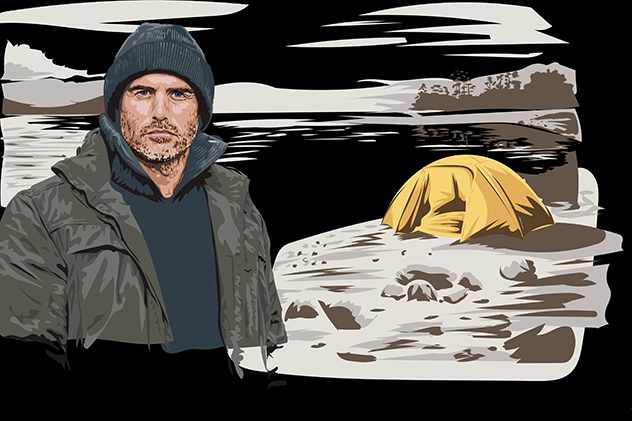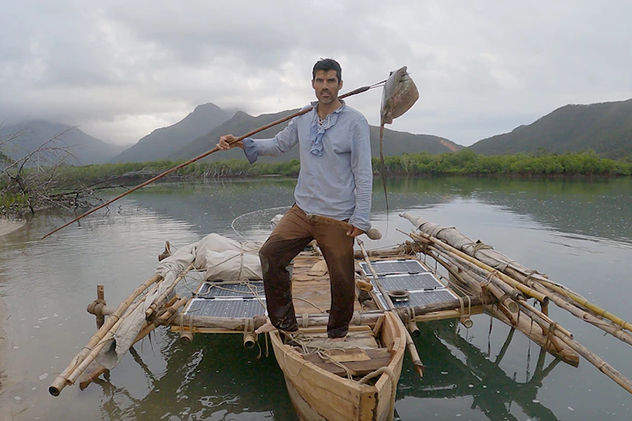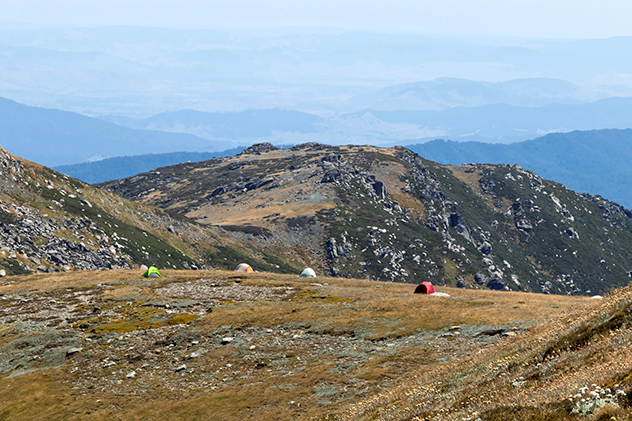
Michael Atkinson had two life goals laid out before him growing up in Canberra. And he owes both of them to film and television.
“I loved Top Gun and wanted to be a fighter pilot, and I watched The Bush Tucker Man,” he says. “I pursued piloting first and now I’m doing this second.”
Mike’s split path meant that even during the highs of a 21-year career in the Australian Defence Force, the wheels were quietly turning on his other passion: the Aussie bush. About 10 years ago, he made a dedicated switch.

Illustration: Felipe Ubilla
Mike’s first film, Surviving the Outback (2018, pictured below), combined his love of storytelling and the extreme outdoors, featuring on the Banff Film Festival world tour. His status was elevated again in 2023 after enduring 64 days in the bush on season one of the SBS survival series, Alone Australia.
Since then, Mike has become a key voice in opposing proposed increases to camping fees in NSW national parks, using his savvy online platform to educate the public and even help highlight the issue in state parliament.
So how did Mike’s foray in the wilderness begin and why has he been so instrumental in campaigning against proposed camping fee increases? We caught up with the Nelson Bay resident while he was driving his trusty Toyota Troopy to Far North Queensland.

What was life like for you as a youngster?
I grew up in Canberra and used to go camping and fishing regularly with my family up in the snow, in the Brindabellas, or down the South Coast. We would camp every holidays – usually in a national park with other families. I lived in Canberra until I was 18. In my last five years there, things got tight financially, so camping really became my thing. That’s an important driving factor for why I’m doing what I’m doing now.
What was it about the outdoors that appealed to you at a young age?
My dad was always into fishing and, for some reason, I just thought the outdoors was the coolest thing ever. Our house backed onto the bushland and I spent all my time out in the bush and making exploding arrows and experimenting with weird things. I love the romance of being out in the bush. To be honest, all the things I thought were cool when I was five years old are the things I think are cool now.
You’ve been an opponent of proposed camping fee increases in NSW National Parks. When did you notice this was an issue?
One year ago, I went camping at Kosciuszko National Park. I’d heard people complain about ghost bookings [where people book a site but don’t show up] and this place I’d been to my whole life was booked out. I had to go to another camping spot and there was apparently one spot left. When I got there the site was 75 per cent empty.
Before COVID, there was no booking fee; you just turned up and it was first in, best dressed. The booking system came in and people realised that because it was so cheap to book the site, you’d just do it even if the trip fell through.

What is the best alternative?
The solution is to go back to the pre-COVID way of doing things. The one problem is National Parks has not kept up campground numbers with Australia’s own population growth and demand. That’s a recipe for charging higher prices.
There’s an argument to say you can’t have more campgrounds because they wouldn’t pass environmental impact statements – but that’s based on an incorrect understanding of the Australian bush. Even if you take an acre of a national park and remove all the undergrowth and invasive species, that’s actually a net benefit for the acre of land compared to the unmanaged state that it’s in now.
What about Aboriginal land management?
Most NSW national parks are choked up with undergrowth, the trees are spaced too closely together and there’s almost no grass on the ground. When you have the ‘nature knows best’ attitude, it’s well-intentioned but there’s no food for the animals and every 10 to 20 years it’s wiped out by severe bushfire. Aboriginal people figured that out 11,500 years ago; traditional burning is an intensive strategy based on really good ecological understanding.
What do you want your legacy to be?
The most important thing is the state of the Australian bush. It should be returned to its pre-European health. There’s also the importance of humans being connected to the bush, because if they’re connected and involved in it, they will look after it. We’re less happy as a society if we don’t get outdoors.
